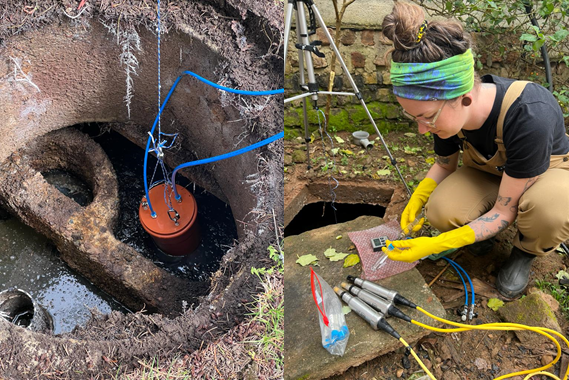Department Sanitation, Water and Solid Waste for Development
Greenhouse Gas Emissions from Non-Sewered Sanitation Systems: Improving Emissions Estimates from Containment

Context
Addressing the need for globally relevant data, this study uniquely measures point-source GHG emissions directly from containment systems in contrasting settings: the rural higher-income environment of Vancouver Island, Canada, and the urban lower- to middle-income context of Kampala, Uganda. This dual-site approach not only addresses a critical gap in the literature, which shows sparse reporting of direct GHG estimates from non-sewered systems, but also sets the stage for a broader understanding of emissions dynamics across diverse economic and environmental landscapes.
Similar to what we have learned from evaluating characteristics of stored wastewater, point source emissions data also prove insufficient unless they are integrated with the existing body of scientific knowledge. The Quantities and Qualities (Q&Q) approach for city-wide estimations will be employed to create more accurate and scalable projections of methane emissions. Moreover, addressing the potential overestimation prevalent in previous studies is crucial. Field-based studies indicate that IPCC guidelines might overestimate emissions, therefore enhancing the precision of emission estimates through refined methodologies will aid in the formulation of effective sanitation-borne GHG management strategies.
Goal
The objective of this study is to utilize advanced microbial methods to evaluate the pathways of degradation of organic matter during storage in containment and subsequent GHG emissions. This includes insights from the study of microbial processes within containment systems, where molecular microbiology techniques such as paired metagenomics and metatranscriptonomics elucidate how organic matter is degraded and contributes to GHG emissions.
Current activities include
- In-situ GHG measurements with a portable gas flux chamber in storage and containment units of non-sewered sanitation systems.
- Comparative analysis of GHG emissions in the urban environment of Kampala, Uganda and the rural settings of Vancouver Island, BC, Canada .
- Direct, in-situ GHG measurements to validate against conventional estimates.
- Development of accurate, context-specific emission factors for NSS.
Collaborators
- Dr. Caetano Dorea (University of Victoria)
- Dr. Charles Niwigaba (Makerere University)
Current funding
- Swiss National Science Foundation (SNF)
- Natural Sciences and Engineering Research Council of Canada (NSERC)
Publications
Shaw, K., Kennedy, C., & Dorea, C. C. (2021). Non-Sewered Sanitation Systems’ Global Greenhouse Gas Emissions: Balancing Sustainable Development Goal Tradeoffs to End Open Defecation. Sustainability, 13(21), 11884. doi.org/10.3390/su132111884
Strande, L. (2024). Integrating recent scientific advances to enhance non-sewered sanitation in urban areas. Nature Water, 1–14. doi.org/10.1038/s44221-024-00240-7


